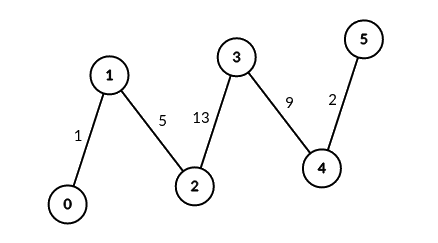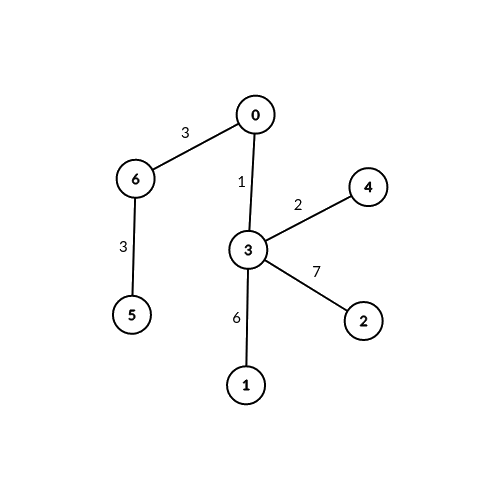3067. Count Pairs of Connectable Servers in a Weighted Tree Network
Description
You are given an unrooted weighted tree with n vertices representing servers numbered from 0 to n - 1, an array edges where edges[i] = [ai, bi, weighti] represents a bidirectional edge between vertices ai and bi of weight weighti. You are also given an integer signalSpeed.
Two servers a and b are connectable through a server c if:
a < b,a != candb != c.- The distance from
ctoais divisible bysignalSpeed. - The distance from
ctobis divisible bysignalSpeed. - The path from
ctoband the path fromctoado not share any edges.
Return an integer array count of length n where count[i] is the number of server pairs that are connectable through the server i.
Example 1:
Input: edges = [[0,1,1],[1,2,5],[2,3,13],[3,4,9],[4,5,2]], signalSpeed = 1 Output: [0,4,6,6,4,0] Explanation: Since signalSpeed is 1, count[c] is equal to the number of pairs of paths that start at c and do not share any edges. In the case of the given path graph, count[c] is equal to the number of servers to the left of c multiplied by the servers to the right of c.
Example 2:
Input: edges = [[0,6,3],[6,5,3],[0,3,1],[3,2,7],[3,1,6],[3,4,2]], signalSpeed = 3 Output: [2,0,0,0,0,0,2] Explanation: Through server 0, there are 2 pairs of connectable servers: (4, 5) and (4, 6). Through server 6, there are 2 pairs of connectable servers: (4, 5) and (0, 5). It can be shown that no two servers are connectable through servers other than 0 and 6.
Constraints:
2 <= n <= 1000edges.length == n - 1edges[i].length == 30 <= ai, bi < nedges[i] = [ai, bi, weighti]1 <= weighti <= 1061 <= signalSpeed <= 106- The input is generated such that
edgesrepresents a valid tree.
Solutions
Solution 1: Enumeration + DFS
First, we construct an adjacency list g based on the edges given in the problem, where g[a] represents all the neighbor nodes of node a and their corresponding edge weights.
Then, we can enumerate each node a as the connecting intermediate node, and calculate the number of nodes t that start from the neighbor node b of a and whose distance to node a can be divided by signalSpeed through depth-first search. Then, the number of connectable node pairs of node a increases by s * t, where s represents the cumulative number of nodes that start from the neighbor node b of a and whose distance to node a cannot be divided by signalSpeed. Then we update s to s + t.
After enumerating all nodes a, we can get the number of connectable node pairs for all nodes.
The time complexity is $O(n^2)$, and the space complexity is $O(n)$, where $n$ is the number of nodes.
1 2 3 4 5 6 7 8 9 10 11 12 13 14 15 16 17 18 19 20 21 22 23 24 | |
1 2 3 4 5 6 7 8 9 10 11 12 13 14 15 16 17 18 19 20 21 22 23 24 25 26 27 28 29 30 31 32 33 34 35 36 37 38 | |
1 2 3 4 5 6 7 8 9 10 11 12 13 14 15 16 17 18 19 20 21 22 23 24 25 26 27 28 29 30 31 | |
1 2 3 4 5 6 7 8 9 10 11 12 13 14 15 16 17 18 19 20 21 22 23 24 25 26 27 28 29 30 31 32 33 34 35 | |
1 2 3 4 5 6 7 8 9 10 11 12 13 14 15 16 17 18 19 20 21 22 23 24 25 26 27 | |




